Original article from Presto Research
Compiled by Odaily Planet Daily Golem ( @web3_golem )
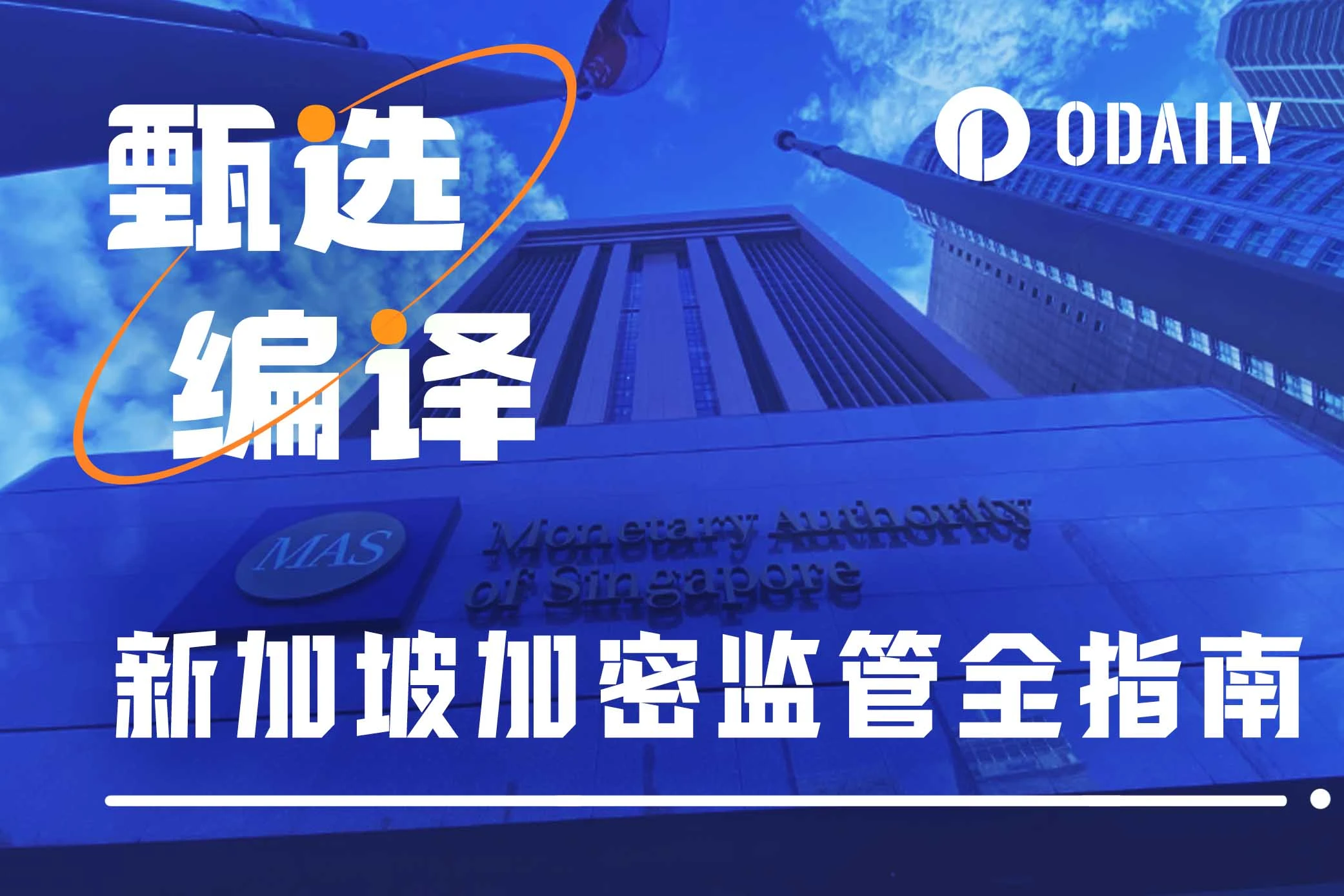
Summarize
While the regulatory landscape for Web3 remains murky in much of the world, Singapore has long been seen as a leader in providing a clear regulatory framework for the various businesses and asset managers within the Web3 industry.
In this edition of Presto Research’s Focus on Asia series, we explore why Singapore is so attractive to crypto businesses by looking at the various components of Singapore’s regulatory environment.
At the end of the article, Alex Svanevik and Hassen Naas, CEOs of Singaporean Web3 companies Nansen and Laevitas, shared their reasons why they believe Singapore remains the most attractive base for crypto companies .
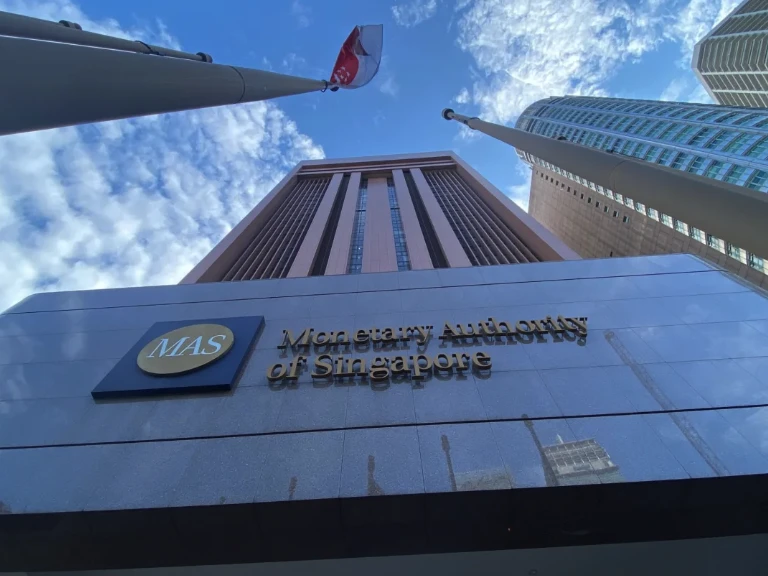
Figure 1: MAS Headquarters, Source: Presto Research
Overview
As the digital asset landscape continues to evolve, Singapore has become a beacon for crypto businesses and projects looking to establish a foothold in Asia. The country’s unique regulatory clarity, technological infrastructure, and strategic location make it the most attractive destination for a variety of Web3 entities, from cryptocurrency exchanges and token issuers to blockchain infrastructure providers and decentralized finance (DeFi) protocols.
This report provides a comprehensive guide for crypto entrepreneurs, investors, and established players considering Singapore as a base of operations. Our analysis delves into key aspects of Singapore’s crypto ecosystem, examining the regulatory landscape and the real-world experiences of businesses operating within it.
Singapores approach to crypto regulation is characterized by a delicate balance between promoting innovation and mitigating risks. As the main financial regulator, the Monetary Authority of Singapore (MAS) has established a framework that provides regulatory clarity while still adapting to the rapidly changing nature of blockchain technology and digital assets. This report outlines the role of key institutions, including MAS and the Singapore Fintech Association, and their impact on various areas of the crypto industry.
This report explores the licensing requirements and regulatory considerations for a range of crypto-related businesses , including exchanges, payment service providers, token issuers, crypto funds, custodians, OTC trading desks, blockchain infrastructure providers, DeFi protocols, NFT platforms and stablecoin issuers. Singapore regulators have taken a nuanced approach to addressing the question of how different types of digital assets and services should be classified and regulated under existing frameworks such as the Payment Services Act (PSA) and the Securities and Futures Act (SFA).
To provide a comprehensive understanding of Singapore’s crypto ecosystem, this report concludes with insights and experiences from prominent crypto players in Singapore. Through interviews and case studies, we explore the practical aspects of operating a crypto business in Singapore, including the process of obtaining the necessary licenses, meeting compliance requirements, obtaining banking services, and leveraging Singapore’s position as a gateway to the wider Asian market.
By combining regulatory analysis with real-world perspectives, this report aims to equip readers with the knowledge and insights necessary to make an informed decision about whether to establish or expand a cryptocurrency business in Singapore. As the global cryptocurrency landscape continues to change, understanding Singapore’s unique position as a cryptocurrency hub at the intersection of innovation and regulation is critical for anyone looking to take advantage of the opportunities presented by this dynamic market.
Singapore Regulatory Authorities and Their Roles
Singapore’s strong and progressive regulatory framework has played a crucial role in attracting Web3 founders, protocols, hedge funds, and venture capital firms. The country’s approach to digital assets and blockchain technology is characterized by a balance between innovation and risk management. There are two main regulatory bodies overseeing the cryptocurrency and blockchain space:
Monetary Authority of Singapore (MAS)
MAS is Singapore’s central bank and integrated financial regulator. Its jurisdiction includes:
Licensing and regulating digital payment token (DPT) services under the Payment Services Act (PSA);
Oversee crypto derivatives traded on approved exchanges;
Anti-Money Laundering and Terrorist Financing (AML/CFT) compliance for cryptocurrency businesses;
Issue guidelines on digital token issuance and digital payment token services.
MAS has been actively engaging with the industry to regularly update its regulatory framework to address emerging risks and opportunities in the Web3 space.
Accounting and Corporate Regulatory Authority (ACRA)
While ACRA is not specifically targeting Web3, its regulatory scope is related to entity formation and corporate compliance:
Overseeing the registration and regulation of business entities in Singapore;
ensuring compliance with corporate governance standards;
Maintaining a company registry, including companies in the Web3 space.
Singapore FinTech Association
Although not a regulator, the Singapore FinTech Association plays a vital role in the ecosystem:
Act as a bridge between industry and regulators;
Promote Singapore as a fintech hub and foster innovation;
Provide a platform for cooperation between traditional finance and Web3 companies;
Providing educational resources and networking opportunities for blockchain and cryptocurrency startups.
The interaction between these entities creates a comprehensive ecosystem that supports Web3 innovation while maintaining Singapores reputation for regulatory transparency and financial stability. This balanced approach helps make Singapore a jurisdiction of choice for Web3 founders and businesses.
Regulations and types of licenses required for various crypto businesses
There are various licensing requirements for entities involved in the Web3/cryptocurrency industry - below we explore some types of businesses and their associated licenses.
Payment service providers (including digital payment token exchanges):
These fall under the Payment Services Act (PSA) and require a license from MAS. There are two relevant licenses:
Standard Payment Institution License (SPI): For smaller businesses;
Major Payment Institution License (MPI): For larger businesses that process higher transaction volumes. Currently 28 entities have MPIs under the Digital Payment Token Services business type, including Blockchain.com, Circle, Coinbase, etc.
Both licenses require compliance with AML/CFT regulations, risk management practices and customer protection measures.
Token Issuer
The regulatory approach depends on the type of token:
Security tokens: fall under the Securities and Futures Act (SFA) and require a Capital Markets Services (CMS) license;
“Utility” tokens: No specific permission may be required, but issuers should consider whether they have other obligations, for example if their tokens amount to digital payment tokens, which would require obligations under the PSA.
Crypto Funds
Depending on their structure and activities, they may need a CMS license to conduct fund management.
Cryptocurrency Custodians
A PSA license is required to provide custody services for digital payment tokens. ;
MAS guidelines on safeguarding digital assets must be followed.
OTC Trading Desk
Depending on the products traded, a CMS license may be required to trade capital markets products and/or a PSA license to provide digital payment token services;
Must comply with AML/CFT regulations.
Blockchain infrastructure providers
A specific license is not usually required unless engaged in regulated activities;
General business laws must be followed.
DeFi Protocols
Currently operating in a regulatory grey area.
NFT Platform
A license may be required depending on the nature of the NFTs being traded (for example, if the NFTs are considered securities) or whether the platform has fiat or DPT on- and off-ramps.
If facilitating financial transactions, AML/CTF regulations must be followed.
Stablecoin issuers
Subject to the MAS’ regulatory framework for stablecoins to be implemented in August 2023.
Single-currency stablecoins (SCS) issued in Singapore and pegged to Singapore’s fiat currency or a G10 currency will be subject to the MAS stablecoin regulatory regime. Other stablecoins will continue to be subject to the existing regulatory regime under the PSA.
Under the MAS stablecoin regulatory regime, SCS issuers must comply with specific reserve backing, redemption and disclosure requirements.
Other key considerations
All entities must be registered with ACRA and comply with general corporate regulations;
All categories must comply with AML/CTF regulations;
Foreign entities may need to establish a local branch to obtain a license;
The regulatory landscape is constantly evolving, with the Monetary Authority of Singapore regularly updating guidance and introducing new frameworks.
This overview provides a snapshot of the current regulatory environment, however it does not constitute legal advice. Given the rapid developments in the cryptocurrency space, businesses must engage directly with the Monetary Authority of Singapore or seek legal counsel to ensure full compliance with the latest requirements.
Beyond Regulation: Why Singapore Remains Attractive in the Web3 Space
As mentioned above, Singapore’s regulatory landscape is comprehensive and provides clarity for a wide range of cryptocurrency industry players. But Singapore’s advantages don’t stop there: a long-standing good reputation among expats, a world-class education system, national security and family-friendly infrastructure, and a strategic location are all non-crypto-specific factors, but they are also what make Singapore attractive to crypto founders. We learned from two founders about their decision to base their companies in Singapore.
Nansen founder Alex Svanevik: Government leadership, open to foreign talent
Nansen is an on-chain analytics company based in Singapore. Co-founder and CEO Alex Svanevik talked about why he decided to base the company in Singapore:
“Singapore is where East meets West, where the private sector meets the public sector, and where finance meets technology. It is one of the few countries in the world that was governed for decades (until recently) in the ‘founder model’ – by Lee Kuan Yew. It is still run by the most capable government in the world. For these reasons, I think it is a great place to run a business.”
Svanevik pointed to Lee Kuan Yew’s leadership, highlighting a key aspect of Singapore’s success: its openness to foreign talent. Lee Kuan Yew himself stressed this strategy, saying, “If Singapore relied on talent that it could produce from its 3 million people, it would not be able to outperform…Singapore’s economy is vibrant because we have been attracting talent from all over the world, from South Asia, Northeast Asia, China, India, and so on, far beyond what 3 million Singaporeans could produce.”
This philosophy of embracing global talent has been a cornerstone of Singapore’s economic strategy, greatly enhancing Singapore’s attractiveness to entrepreneurs and businesses, including those in the Web3 space.
Singapore’s appeal as a business hub is more than just anecdotal. Data from the Accounting and Corporate Regulatory Authority (ACRA) shows that the number of company registrations in Singapore continues to rise (Figure 2). And data from the Ministry of Manpower (MoM) shows that employment pass (EP) growth has rebounded in the post-COVID-19 era (Figure 3):
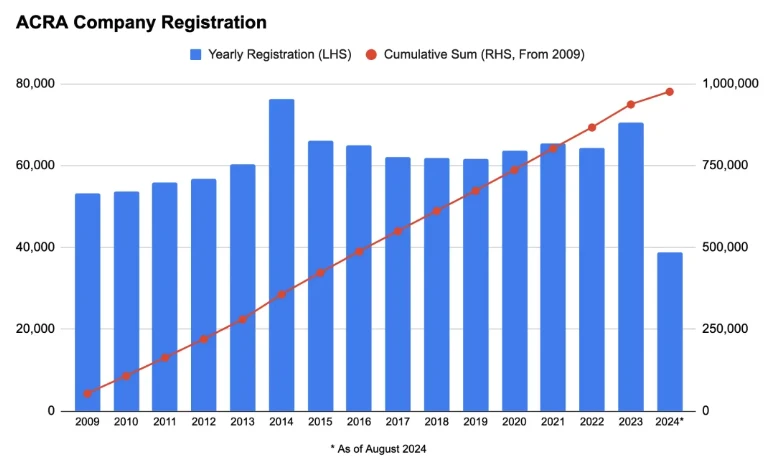
Figure 2: The number of registered companies in Singapore has been growing. Source: ACRA via data.gov.sg
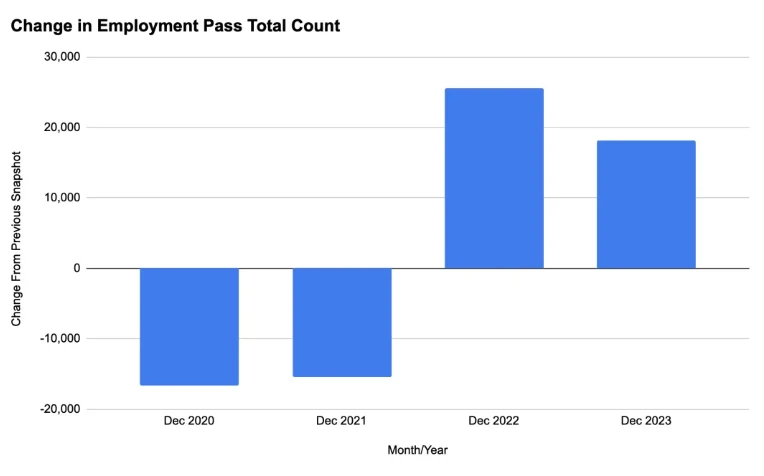
Figure 3: Although the number of EPs declined during the pandemic, the rebound momentum is strong. Source: Ministry of Manpower (MoM)
Hassen Naas, founder of Laevitas: Experiencing benefits beyond expectations since relocating to Singapore
Laevitas is a quantitative data analysis company focusing on crypto derivatives. As the founder and CEO of the company, which relocated its headquarters to Singapore, Hassen also provides a unique perspective on Singapore.
“The decision to relocate a company’s headquarters is not easy, especially for companies in Web3, as the industry is viewed with some skepticism in many jurisdictions. I think there is this self-fulfilling dynamic in Singapore that continues to strengthen Singapore’s position as a startup tech (and now Web3) hub: companies move to Singapore because of its advantages, such as clear regulations, ease of living, thriving financial and tech sectors, abundant talent pool, and tax incentives, which encourages regulators and the government to provide clearer regulatory and business frameworks. This in turn incentivizes more companies to locate in Singapore, strengthens the regulator to make further improvements, and so on.
Singapore has a large network of businesses and funds, both crypto and non-crypto, and since relocating to Singapore, we have experienced all the benefits we expected and more. We have many updates coming up, such as alert systems for market structure changes, order book imbalances, and TWAP changes, and we are excited to proudly continue to operate in Singapore.”
The supportive regulatory environment mentioned by Hassen has led to a high rate of cryptocurrency adoption. As recently published by investment immigration consultancy Henley Partner, Singapore is a world leader in cryptocurrency adoption (Figure 4). Henley highlighted a strong regulatory environment, innovation, and technology as key factors that have propelled the country to the top of the 2024 list.
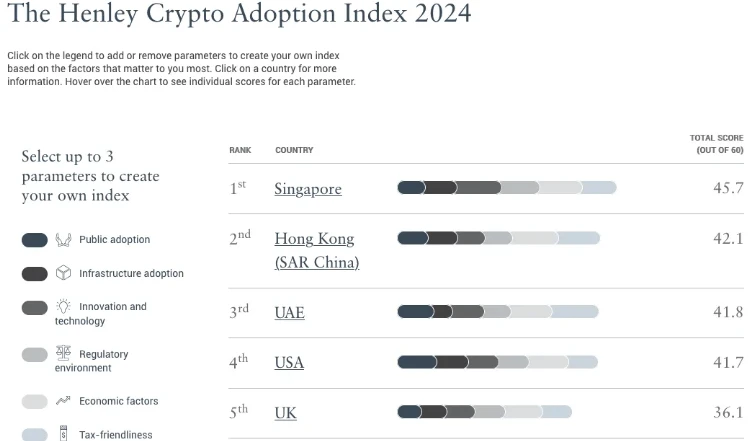
Figure 4: Singapore leads in overall cryptocurrency adoption. Source: Henley Partners
Conclusion
It’s no accident that Singapore has become Asia’s leading cryptocurrency hub. The country has carefully nurtured an environment that balances innovation and regulation, creating fertile soil for Web3 businesses to thrive. The clear regulatory framework provided by the Monetary Authority of Singapore, coupled with Singapore’s strategic location, world-class infrastructure, and pro-business policies, continue to attract founders and companies from around the world.
Singapores adaptable regulatory approach enables it to maintain a competitive edge as the crypto industry evolves. Testimonials such as Alex Svanevik and Hassen Naas highlight the tangible benefits of operating in this ecosystem. While challenges remain, especially in emerging areas such as DeFi, Singapores track record suggests it will continue to improve its approach, balancing innovation with prudent risk management.
For entrepreneurs and established businesses alike, Singapore offers a blend of Eastern and Western culture, financial acumen, and technological prowess. As the global cryptocurrency landscape continues to change, Singapore’s role as a beacon of stability and innovation in the Web3 space looks set to grow even stronger.










